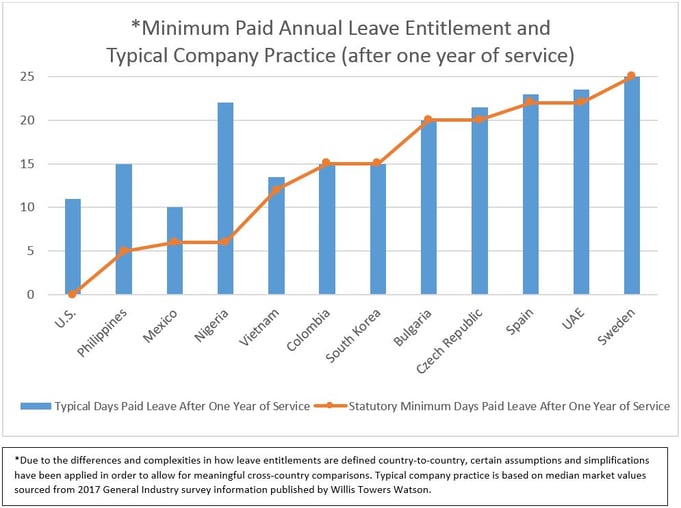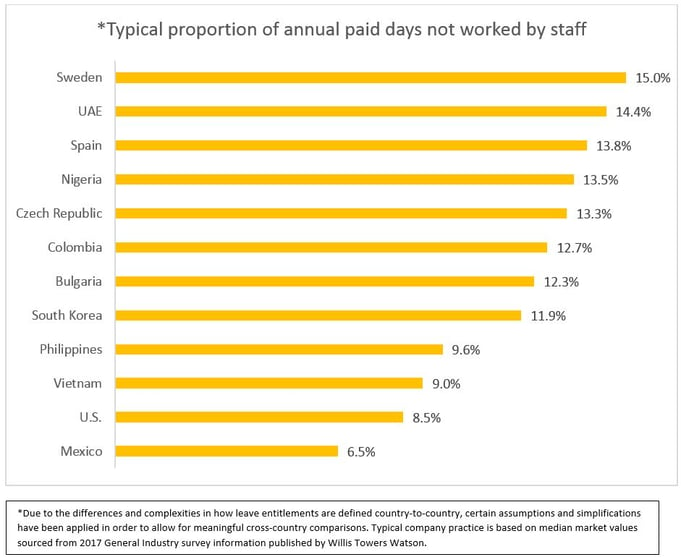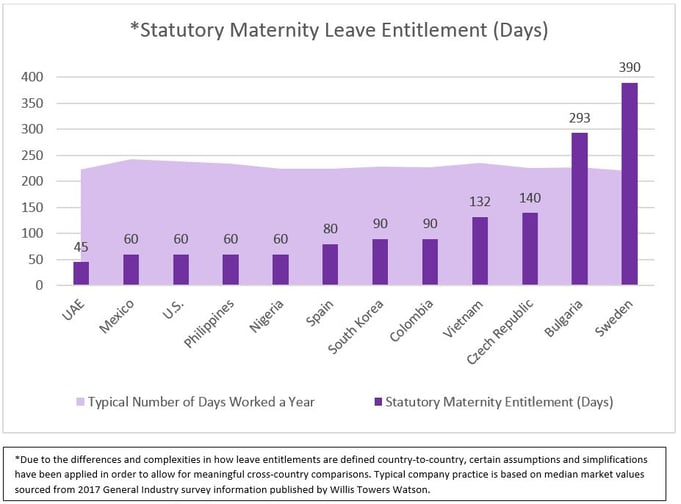In today’s talent management environment, the most successful employers are the ones who listen. In Willis Towers Watson’s 2017/2018 Global Benefits Attitudes Survey, we see that benefits are more important to employees than ever before. While retirement and medical benefits tend to top employees’ list of priorities, paid time off ranks relatively high around the world. Additionally, the topics of workforce flexibility and work-life balance continue to receive significant attention from employers who want to attract, retain and engage talent. More and more, top employers give prominence to employee success, satisfaction and security outside of the workplace, as well as within, as part of their employee value proposition, in effort to help them stand apart from competitors vying for the same talent pool.
For U.S. employers, decisions and programs regarding leave – paid and unpaid – are largely voluntary given the general lack of legal requirements or other employer obligations. As a result, company leave practices are rather diverse and employers are able to heavily customize their leave programs. However, when those same employers begin to open operations abroad, they often find themselves upon a very different playing field. From country to country, employee leave entitlements vary massively and may leave employers with relatively few options. While policies and entitlements modeled on voluntary U.S. practices may work in some places, in many others they will not meet minimum requirements. In addition, leave entitlements in some countries can be generous and complex, masking real workforce planning pitfalls for employers caught unaware. As a result, while companies commonly wish to establish globally-uniform leave benefits, in reality this can be very challenging or even impossible depending on the countries involved.
Globally-speaking, most markets have some form of minimum employer-paid annual leave entitlement which applies to most or all staff, typically after one year of service (prior to that, leave may accrue pro-rata in some cases) and possibly increasing with tenure. Where they exist, minimum entitlements vary substantially, from only five days a year in the Philippines to 25 days in Sweden. In certain markets, determining minimum leave may be more complex (e.g. being accrued against actual time worked or being linked to employment status) and may mandate specific compensation practices as well as time-off (such as annual vacation bonuses which must be paid in addition to normal salary). Generally-speaking, multinational employers do not tend to provide paid annual leave in excess of statutory requirements except when the entitlements are modest. In addition, where they exist, collective agreements often contain specific extra-legal leave practices which employers are bound to follow.

On top of vacation entitlements, public holidays can have a substantial impact on the total number of normal work days that staff are on leave annually. Labor laws in most countries define a minimum number of specific paid public holidays a year which can be as few as one day (France) or greater than the number of statutory vacation days for most staff (such as in Colombia, where employees have 18 days of paid public holidays a year). On top or in lieu of statutory requirements, employers may also provide additional paid holidays voluntarily (a common practice in the U.S.). From a workforce planning perspective, the sum of paid vacation and holidays can represent a noteworthy portion of annual time where staff are not available.

While annual leave and public holidays are relatively straightforward to plan for in most cases, this doesn’t necessarily apply to other types of leave. Good examples are various forms of family-related leave, especially maternity. A paid statutory entitlement in most countries (unpaid in the U.S. under the Family Leave and Medical Act), maternity leave can be substantial, leaving employers without that person’s services for a prolonged period of time.
In addition, family leave (maternity, paternity and parental) has gained increased government attention worldwide, resulting in a large number of statutory changes in recent years. Such changes may establish new/increased entitlements, additional flexibility in how leave may be taken, or both, in order to support broader agendas of family welfare, working women and gender equality. For employers – especially those with a substantial proportion of younger staff – it can represent substantial staffing and business continuity challenges, in particular in those markets where leave entitlements may equal as much as half a working year or more. It also underlines the importance for employers to stay abreast of statutory developments in the countries they operate in to ensure they remain compliant.
Blog Contributor

Darryl Davis is a senior consultant with Willis Towers Watson’s Global Research Unit (GRU) which specializes in helping multinational clients understand and leverage the ever-changing facets of compensation, benefits and employment environments around the world. Since 2000, he’s also assisted numerous companies with their reward market intelligence and design needs both in EMEA as well as globally. Prior to joining the GRU, was a senior consultant with Global Data Services for 15 years and was a regular writer and speaker on EMEA reward market trends. Darryl has a Master in Arts degree from the University of Connecticut and is based in Brussels, Belgium.


